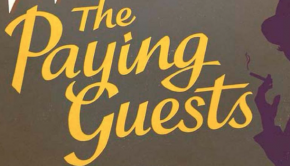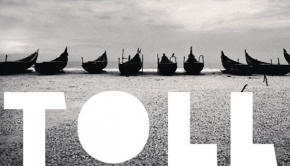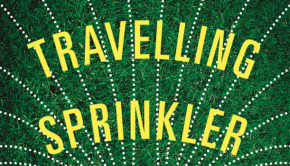Pow! by Mo Yan
Hector Tobar, The Los Angeles Times
“Pow! illustrates how Communist Party bosses have helped create this new China, a country where “moral behavior” is no longer “in fashion,” as the leader of Slaughterhouse Village puts it. And yet Mo, the public intellectual, basically curls up into a ball when it comes to directly criticizing those bosses … I’m going to allow Mo the wiggle room he clearly needs because in the end his skill makes Pow! a wild, unpredictable ride — a work of demented and subversive genius.“
Krys Lee, The Financial Times
“For a writer who purportedly lacks ideological leanings, Mo writes in a surprisingly direct way. He is no fan of capitalism and its attendant values, and the novel is rife with comments such as “Owning a Madonna fur or leather coat is the dream of young men and women with empty purses.” But he reserves his greatest criticism for officials, including the mayor who “smells like shit” and strangers driving into town who must be “high-ranking cadre” since they are in flashy foreign Audis. The heart of Pow!, and its greatest sympathies, are on display in Xiaotong’s comment that “In today’s society … the best that labouring people can hope for is to make enough to live a decent life. Most never even manage that … ”“
Chris Cox, The Observer
“Yan creates extremely powerful characters, especially Xiaotong’s mother, whose struggle to raise him after his father quits town with another woman is the most moving strand of the story. And, pleasingly for a novel about meat, Howard Goldblatt’s translation is frequently poetic – making countless passages about shining entrails, greasy pig heads and steaming pots of dog flesh all but waft off the page.“
Maya Jaggi, The Literary Review
“Pow!, originally published in 2003, is a bravado and blackly comic satire that telescopes decades of Chinese history. Set ostensibly in the post-Mao Reform era of the 1980s and early 1990s, its timeline is blurred by a mendacious narrator – a ‘Powboy’ or fibbing braggart, who looks back on his childhood from the year 2000. Luo Xiaotong, now twenty and once the ‘world’s most gluttonous boy’, tells his story to a Wise Monk in a ruined temple, as he bids to become a Buddhist novice. “
Ian Buruma, The New York Times
“The political perspective of his fiction is also a reflection of his peasant spirit. To a villager, all politics are strictly local, especially in China, with its vast distances. The capital is far away. National politics aren’t the peasant’s concern. What counts is food on the table, fertility, sex and staying out of trouble, if necessary by appeasing the powerful, be they local or foreign.“
En Liang Khong, New Statesman
“Does this visceral orgy of butchery point to disturbing trends within the whole spectrum of modern Chinese literary culture? With its heavy dose of hallucinatory realism, critics have argued that Mo’s literary landscaping escapes the very real problems of contemporary China and that his crude strokes can even be seen as a symptom of an increasingly marketised writing culture. It is hard to square this with Pow!’s dark, satirical take on the violent, materialist and morally corrupt undercurrents of society.“
Dwight Garner, The New York Times
“Like many Mo Yan novels Pow! is difficult to warm to. There are few characters to admire; the novel’s heart is antic but also icy. Mr. Mo has also begun to go back to the well for some of the same imagery … Readers of Pow! will find these warring assessments mingling in their minds. It’s a multi-angled book, one in which no character or political system emerges unscathed. Mr. Mo, who says he does not consider himself political, is nonetheless an equal-opportunity dispenser of irony and ridicule.“
Peter Kemp, The Sunday Times
“Set in a greedy peasant society evolving into gangster capitalism, this melodramatic scenario might suggest that Pow! is crudely simplistic. In fact, it is crudely eclectic. Seeking to emulate writers such as Günter Grass and Gabriel Garcia Marquez, Mo intersperses his elementary moral fable with wildly absurdist stuff: apparitions, cartoonish calamities, clownish monstrosities and surreal fantasies.“
Yiyun Li, The Guardian
“Pow! is his first novel to appear in English since the Nobel honour. Politics aside, this book seems to represent everything that has gone amiss in Mo Yan’s work, and perhaps in a broader way what has gone awry in China’s literature of the last 30 years … One cannot say that Mo Yan has not criticised China in his portrayal of the village, but rather than exploring the darker undercurrents of society or the depths of the characters, he seems to make it his goal to stay on the surface. Much of the energy of the novel is spent on long and sensuous descriptions of butchering, cooking, eating and other bodily functions. “
Julia Lovell, Times Literary Supplement
“It is possible to sympathize with the aims of Mo Yan’s fictional project: to evoke the brash chaos of contemporary China through a style of equally jumbled vulgarity. But the apparent carelessness with which Pow! is written becomes trying. (In China, the author is famed for the speed at which he writes: he has claimed to have produced the 550,000 characters of Life and Death Are Wearing Me Out in forty-three days.) Pow! contains little in the way of psychological coherence or plot development. Luo Tong abruptly turns from a gluttonous libertine into a henpecked husband; Jiaojiao is killed off in three sentences. The book is largely devoid of precise, striking language.“
OMNISCORE:












